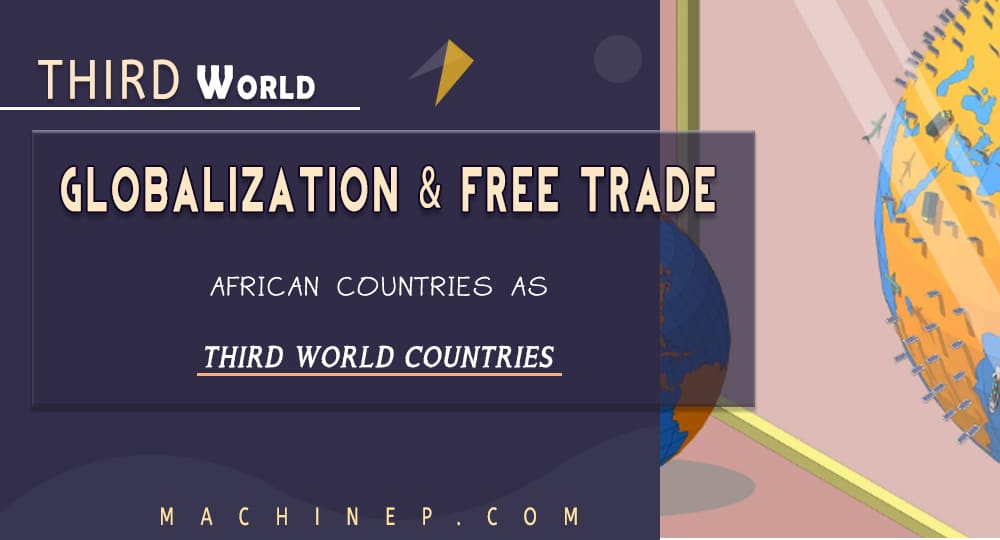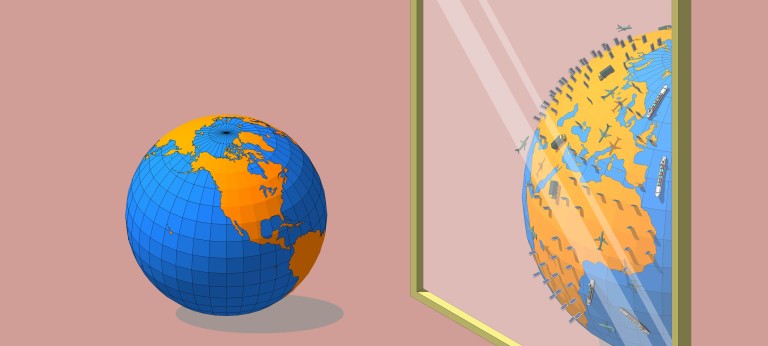Third World and Dependency refers to the less developed countries and their dependency on the developed (First World) for advanced living. In order to broadly categorize the nations of the Earth based on political and economic divisions, there is a hierarchical categorization of the nations into three; the First World, Second World, and the Third World.
The term “Third World” is used less and less in the contemporary time. Thus, the term has been replaced with terms such as ‘least developed countries, developing countries, less civilized countries, or the Global South. However, it will not be mistaken to say the term has been outdated most recently.
Because many Third World countries were economically poor and non-industrialized, it became a stereotype to refer to poor countries as “third world countries”, especially African countries. Nigeria, as one of the Third World Countries, is the center of this discourse. However, this article focuses on the following issues:
Meaning of Globalization and Free Trade
Globalization is a historical process involving a fundamental shift or transformation in the spatial scale of human social organization that links distant communities and expanded the reach of power relations across regions and continents. The keyword of note is that globalization is linked to liberalization, modernization, and universalization.
- Globalization is a transformational process.
- Globalization creates an awareness of cultural similarities and differences.
- Globalization leads to greater efficiency in the use of capital and other factors of production etc.
Free trade, on the other hand, is a theoretical policy under which governments impose absolutely no tariffs, taxes, or duties on Imports, or quotas on Exports. In this sense, free trade is the opposite of protectionism, a defensive trade policy intended to eliminate the possibility of foreign competition.
Reasons Why Globalization and Free Trade have not been Favorable to the Third World Countries, especially Nigeria
The third world dependence on foreign trade links and on the monopoly of capital of the industrialized world has produced, among other things endemic economic consequences.
Firstly, the international economic system, free and unfair trade, has rendered third world economies as chronic victims of adverse balance of trade and payments. For example, the price of primary products such as cocoa, palm produce, peanuts (groundnuts), cotton, etc. from Africa, have been subjected to evident price falls while the prices of goods manufactured in the advanced industrialized countries of western Nations appreciate from year to year in the prices they sale finished products emanation from their industries.
Capitalism as a western economy force with its agents; the multinational corporations, international monetary fund (IMF), and the world bank have blurred the lines of economic vision of African Nations, particularly, the newly independent sovereign states. They have been forced directly or indirectly into the dependency syndrome mentality.
As a consequence of the capitalist mode of production, which third world Nations have been lured to embrace as a colonial legacy, concentrate the means of production, distribution and exchange in the hands of a privileged few. Western Nations and their agents; multinational corporations making it difficult if not impossible for third World Nations to compete with western capitalist Nations in the highly competitive global market.
Nigeria and other third world economies are rich in agricultural land and in mineral deposits such as oil and gas but developed nations of the west through their multinational corporation extract and refines most of these mineral resources with their own advanced technology.
Furthermore, the third world Nation’s problem has, thus, become how to generate capital for their individual national development and to use such to develop their own nature-endowed resources.
Third world nations, therefore, produce what they do not consume, and consume what they do not produce. This situation destroys the local growth of industries and denies the people the opportunity to develop their own indigenous processing techniques.
In summary, increasing dependence on foreign investment and capital especially at the level of unprecedented proportion can only delay Third World Nation’s chance of political and economic development.
Explanation to why modernization, westernization, including the adoption of free market economy have not developed Nigeria to the level of America or any of the Asian tiger countries
The term modernization refers to the process whereby societies or social institutions change or move from traditional or less developed ones into the types of technologies and associated social organizations that characterize the advanced, economically prosperous, and politically stable Nations of the western world.
Reasons, why modernization, westernization, and free-market economy have not developed Nigeria to the level of America or any other Asian countries, are as follows:
- The task of developing a society lies in the hand of individuals whether leaders or followers
- The ethnicity problem
- Leadership succession
- Unstable political system
1. The task of developing a society lies in the hand of individuals whether leaders or followers
In his strong position, Hag(1973:110) states that: “ citizens of developing Nations should be blamed for much of the present mess of underdevelopment. Myles(2000) believes that the position of one’s underdevelopment is a result of the darkness of vision, ignorance, and blind to God’s principle.
In Nigeria, for instance, the proceeds from the oil boom of the 1970s have made our leaders not see other material resources to exploit like gold, tin, zinc, lead, salt, coal, etc. These, if properly explored and harnessed, would have stabilized Nigeria’s economy rather than crude oil.
2. The second factor is ethnicity problem
Ethnicity is an enemy of growth, progress, and development. “The major single obstacle to development in Africa is tribalism.”
The colonial authorities did not consider the ethnic boundaries when they shared Africa to themselves. This ignorance is wholly responsible for ethnic, tribal, and international wars in Africa and the third-world countries today.
In Nigeria, a bloody civil war was fought for three good years (Nigeria and Biafran Civil War) between Joly 1967 and 15th January 1970. It is not different in other African nations. Countries like Congo, Liberia, Angola, etc. It has rendered many people homeless and has made many refugees even in their countries of abundance.
3. Leadership Succession
Nigeria and other third world nations are blessed with abundant human and material resources. It may be useful to argue that the inability of the leaders of these countries to make proper use of these resources has been responsible for her unstable socio-economic, educational, and political systems.
Most of the leaders of the third world Nations are power-drunk and never believe that the grace of God in others can enable them to lead even better than them. The power of incumbency is a political disease.
4. Unstable Political System
This is mostly an endemic feature that characterizes most of the Nations that are classified as third world. The military in African countries and other third world Nations have abandoned their traditional function of defending the territorial integrity of their countries and picked up administrative functions. They fear not the civilians who own in totality the administration.
Effective Suggestion of an Economic System Suitable for a Third World Country like Nigeria
An economic system that will be suitable for a third world country like Nigeria is a mixed economy. A mixed economy where both the government and private individuals can engage in the production of goods and services. The type of economic system gives room for individuals to exhibit their talents and skills thereby earning income for themselves and also contributing to the growth of the Nation’s economy.
Just as in America, the major source of their economic growth and employment is a private business. If Nigeria adopts this mixed economy, there will be employment opportunities as these private industries will employ people who will help in the production of goods and services. This system allows both the government and the private individuals access to ownership of properties and industries.





